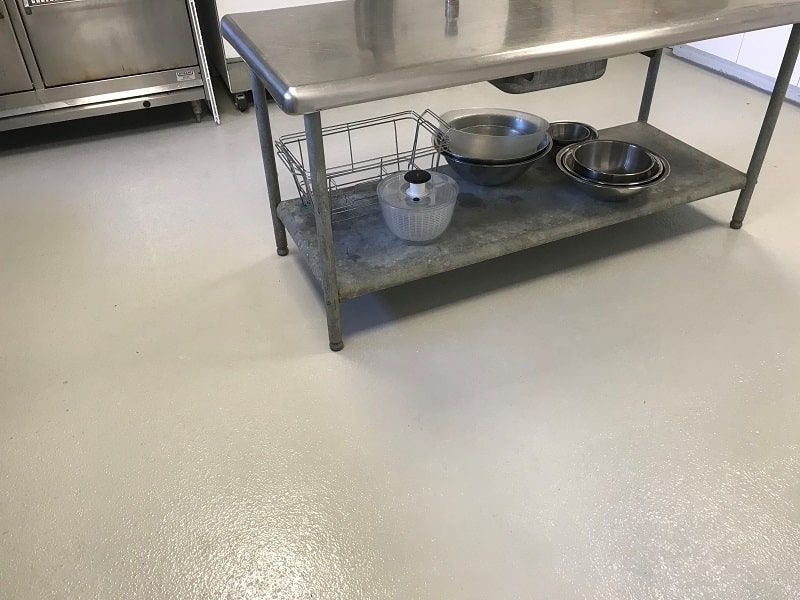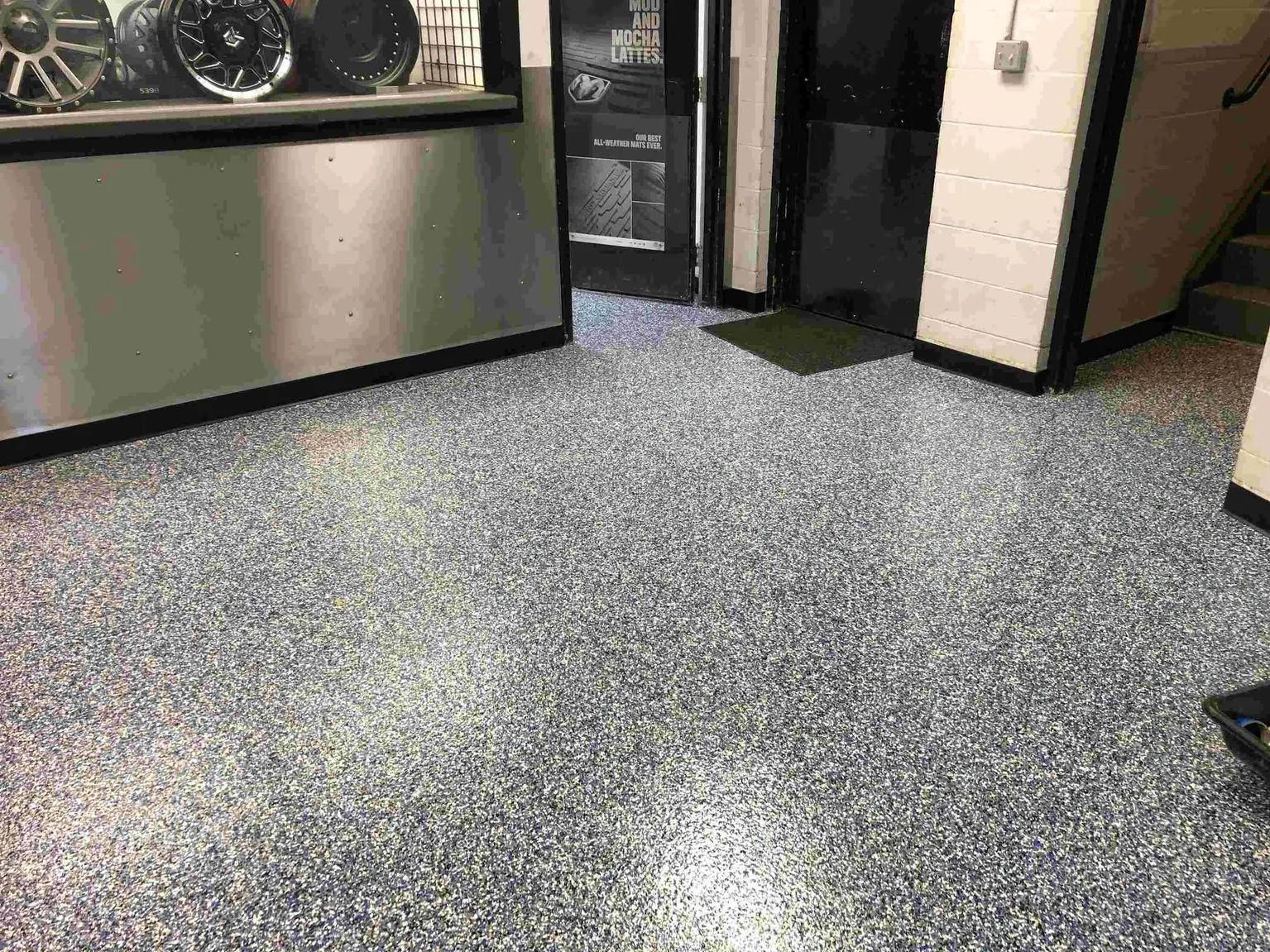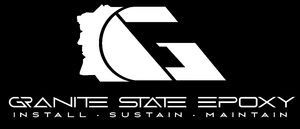Why Epoxy Flooring is the Best Choice for Industrial Spaces
When selecting flooring for industrial spaces, durability, functionality, and safety are non-negotiable. Epoxy flooring meets these demands and more. This blog post dives deep into why epoxy flooring is the superior choice for industrial environments, offering a blend of resilience, cost-effectiveness, and easy maintenance that no other flooring solution can match.

Epoxy Flooring Offers Excellent Durability For Industrial Facilities
What is Epoxy Flooring?
Epoxy flooring is created by mixing a resin with a hardener, which forms a durable coating when applied to concrete. Once cured, it becomes a hard, seamless surface that bonds firmly to the floor underneath. Known for its strength and resistance to wear, epoxy is a go-to choice for industrial and commercial spaces that deal with heavy equipment, chemicals, or constant traffic. In places like Manchester, NH, epoxy has become a trusted solution for businesses looking for a long-lasting, low-maintenance flooring system that performs under pressure.
Benefits of Epoxy Flooring for Industrial Spaces
In industrial settings where heavy machinery, forklifts, and nonstop activity are part of the daily routine, your flooring needs to be tough enough to keep up. That’s where epoxy stands out—it’s built to take on high-impact environments without breaking down.
- Built for Heavy Use
Epoxy floors are designed to handle the weight and movement of machinery without cracking or wearing out. Unlike bare concrete, epoxy offers a tougher surface that holds up over time.
- Resistant to Scratches and Impact
Daily wear doesn’t phase it. The hardened surface resists scuffs, dents, and chips—keeping your workspace safer and looking better, longer.
- Long-Lasting Performance
When done right and cared for over time, epoxy flooring can easily hold up for 20 years or longer—even in tough, high-traffic environments.
Epoxy floors provide a durable solution that resists wear and damage. With over 10 years of experience in Manchester, NH, Granite State Epoxy has helped local industrial businesses stay operational by delivering flooring solutions that withstand extreme conditions. The increased durability ensures fewer repairs and longer-lasting results.
Epoxy Flooring Enhances Safety
Slip-Resistant and Highly Visible
In industrial environments, safety is a top priority—and the right flooring can make a big difference. Epoxy flooring offers several built-in features that help create a safer, more efficient workspace.
- Slip-Resistant Surface
Epoxy coatings can be customized with textured finishes that provide extra grip, helping to prevent slips and falls—especially in areas prone to spills or moisture.
- Improved Visibility
The glossy finish of epoxy reflects light, brightening up large spaces and improving overall visibility. Better lighting means fewer hazards and a safer environment for workers.
- Protection Against Chemicals
Epoxy flooring stands up to harsh substances like oils, acids, and solvents. That resistance not only extends the life of the floor—it also helps protect workers by reducing the risk of exposure to harmful spills.

Easy Maintenance and Cleaning
Simplified Upkeep
In busy industrial settings, the last thing you need is a floor that’s hard to maintain. Epoxy flooring simplifies upkeep, helping you keep your facility clean and running smoothly with minimal effort.
- Resists Dust and Debris
Thanks to its seamless, non-porous surface, epoxy flooring doesn’t trap dirt or dust. A quick sweep or mop is usually all it takes to keep things clean.
- Won’t Absorb Stains
Epoxy naturally resists stains from oil, chemicals, and other spills. You won’t have to worry about permanent marks or surface damage from everyday industrial use.
- Lower Maintenance Costs
Because epoxy is so easy to clean, it cuts down on both time and labor. That means fewer interruptions, less downtime, and reduced long-term maintenance expenses.
Customization Options for Epoxy Flooring
Tailored for Industrial Use
Epoxy flooring offers more than durability—it’s also highly adaptable. Whether you need specific colors to match your branding, textured surfaces for added safety, or marked zones for equipment and foot traffic, epoxy can be customized to fit your exact needs. In industrial settings, these details matter. From clearly defined safety areas to in-floor logos, epoxy helps create a space that’s both functional and professional. Here in Manchester, NH, we’ve worked with a wide range of businesses to design floors that not only hold up under pressure but also support efficient, well-organized operations.
Color Coding and Safety Markings
In industrial environments, visual organization is key to both safety and efficiency. Epoxy flooring makes it easy to incorporate clear, durable markings right into the surface.
- Defined Zones
Use color to separate work areas—like walkways, loading zones, or restricted sections—so everyone knows where they should and shouldn’t be.
- Built-In Safety Markings
Bright, high-visibility lines and warnings can be added directly into the floor to highlight potential hazards or guide traffic safely through the space.
- Branded Finishes
Want your facility to reflect your company’s identity? Epoxy floors can be customized with logos and branded color schemes to create a polished, professional look.
With these custom features, epoxy flooring helps businesses stay organized, boost safety, and present a clean, cohesive image all at once.
Epoxy Flooring is Cost-Effective
High-Value for Industrial Budgets
The initial cost of epoxy flooring might seem higher compared to other flooring options, but when considering long-term value, epoxy stands out as the most cost-effective solution:
- Fewer Repairs Over Time
Epoxy’s durability means it can handle the wear and tear of heavy machinery, forklifts, and constant foot traffic without cracking or breaking down—saving you from frequent repairs or early replacement.
- Low Ongoing Maintenance
The smooth, non-porous surface is easy to clean and resists stains from oil, chemicals, and spills. That means less time and money spent on upkeep and more time keeping your operations running.
- Improved Energy Efficiency
Epoxy’s glossy finish reflects light, which helps brighten up large workspaces without relying as heavily on overhead lighting—helping you cut down on energy costs over time.
With these advantages, epoxy flooring offers excellent long-term savings for any industrial space.
Resistance to Environmental Factors
Withstands Industrial Conditions
Industrial facilities are often subject to extreme temperatures, moisture, and harsh conditions. Epoxy flooring can handle it all:
Chemical and Temperature Resistance
- Handles High Heat
Epoxy can take the heat—literally. It performs well in areas exposed to high temperatures, like manufacturing plants, foundries, or production lines, without softening or breaking down.
- Resists Chemical Damage
Whether it’s oil, solvents, or harsh cleaners, epoxy flooring stands up to chemical exposure. It helps protect your workspace by preventing surface erosion and chemical staining over time.
- Moisture Protection
In areas with high humidity or frequent washdowns, epoxy offers a dependable barrier. It won’t swell, warp, or crack like traditional flooring materials—making it a great fit for wet or damp industrial settings.
Environmentally Friendly Flooring Solution
A Sustainable Choice
Epoxy flooring is not only durable and cost-effective but also environmentally friendly:
- Long Lifespan Reduces Waste: By lasting longer, epoxy flooring decreases the frequency of replacements, which in turn minimizes industrial waste.
- Non-Toxic Options: Modern epoxy formulas are available with low or no volatile organic compounds (VOCs), ensuring safer air quality during and after installation.
- Energy Savings: Epoxy flooring does more than just look good—it can actually help reduce energy costs. Its high-gloss finish reflects light, which helps brighten large facilities and reduces the need for excessive overhead lighting. That added brightness can make a noticeable difference in energy usage over time. And because epoxy lasts for years with minimal upkeep, it’s a smart, low-waste option for businesses focused on sustainability. In places like Manchester, NH, local companies are already seeing the long-term environmental and cost-saving benefits that come with choosing epoxy.
Industrial facilities looking for an eco-conscious flooring solution should consider epoxy for its sustainability benefits.
Installation of Epoxy Flooring
Professional Installation for Maximum Benefits
In industrial environments, professional installation is key to getting the best performance from epoxy flooring. A reputable epoxy flooring contractor will assess the condition of your existing floors, properly prepare the surface, and apply the epoxy with precision to create a flawless finish.
Steps for Epoxy Installation
Surface Preparation
A strong, lasting epoxy floor starts with the right groundwork. The concrete is carefully cleaned to remove dust, oil, and debris. Cracks and rough areas are patched to create a smooth, even surface. Skipping this step isn’t an option—proper prep is what allows the epoxy to bond fully and stand the test of time.
Priming the Surface
Once the surface is ready, a primer is usually applied. It helps the epoxy bond to the concrete, seals off pores, and prevents bubbles from forming. A good primer makes a big difference in how smooth and even the final coat looks.
Applying the Epoxy
With the primer dry, the epoxy goes down in layers. The number of coats depends on how the floor will be used. Some jobs call for a glossy, glass-like finish; others need texture for traction. Either way, every layer is applied with care and consistency.
Final Finish
The last step is the topcoat. This adds an extra layer of protection, locking in the look and boosting durability. It helps the floor resist scuffs, chemicals, and wear—while keeping that clean, polished finish for the long haul.
How to Choose an Epoxy Flooring Contractor
A long-lasting epoxy floor starts with the person installing it. A contractor who knows the material and the process inside and out can make all the difference—not just in how the floor looks, but how well it holds up. Here are a few key things to watch for:
- Proven Industrial Experience
Choose a contractor with a solid track record in industrial settings. Ask to see past projects—they should be able to show examples of work that’s similar to what you need. - Custom Solutions
Every facility is different. Make sure your contractor can tailor the floor’s design, texture, and durability to match your space and how it’s used. - Proper Licensing and Insurance
Make sure your contractor is both licensed and insured. This isn’t just about paperwork—it’s about protecting yourself. If something goes wrong, you won’t be left holding the bag. It also shows the contractor is serious about their work and follows professional standards.
Frequently Asked Questions
What is the lifespan of epoxy flooring in industrial spaces?
With the right care, epoxy flooring in industrial settings can last anywhere from 15 to 20 years. Its longevity depends on how much traffic the area gets, how often it’s exposed to chemicals, and how well it’s maintained. Epoxy is built to handle heavy loads, machinery, and spills, which makes it a reliable flooring option in tough environments. Regular sweeping and occasional re-coating can go a long way in extending its life.
How does epoxy flooring improve safety in industrial settings?
Epoxy flooring adds multiple layers of protection to your facility. You can incorporate slip-resistant textures to help prevent slips in areas prone to moisture or heavy use. Its glossy finish reflects light, brightening large spaces and improving visibility. Plus, it holds up against spills, chemicals, and heavy wear—minimizing damage and reducing hazards. Many facilities also use epoxy to create clear visual zones, making it easy to separate walkways, workstations, and restricted areas.
Can epoxy flooring be installed over existing concrete?
Yes, it can. As long as the concrete is in decent shape and properly prepped, epoxy goes down just fine. That means cleaning the surface thoroughly and fixing any cracks or damage first. With the right prep and application, the epoxy bonds tightly, creating a smooth, durable surface that holds up well in industrial settings.
Is epoxy flooring resistant to chemicals and heat?
It is. In places where spills, cleaners, or high heat are part of the job, epoxy flooring holds its own. The surface doesn’t soak in oils or solvents, and it won’t start to break down when things heat up. That kind of durability makes it a smart, lasting choice for tough work environments.
Conclusion:
In demanding industrial settings, epoxy flooring stands out for all the right reasons. It’s built to take abuse—whether from heavy equipment, constant foot traffic, or chemical spills—without breaking down. Beyond its toughness, it maintains a clean, sharp appearance that reflects well on your facility. With minimal maintenance and a long service life, it’s not just durable—it’s cost-effective. When you need a flooring solution that works as hard as you do, epoxy delivers.
Granite State Epoxy in Manchester, NH has the experience and tools to get it done right. We help businesses improve safety, durability, and appearance with high-performance epoxy systems built to last. Reach out today to talk through your goals and get a personalized quote—let’s build a better floor for your facility.
